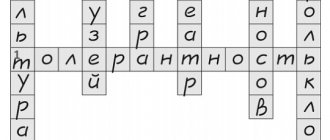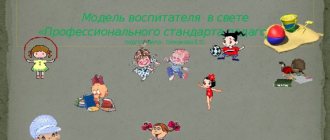Development of the pedagogical council “Business Game”
Pedagogical advice – business game
The pedagogical council is one of the most important and democratic forms of work of the teaching staff, aimed at solving the main issues of school development, improving the educational process and increasing professional skills. Serves for systematic joint discussion of the current state of affairs, exchange of views on controversial issues and problems and development of ways to jointly solve them.
Pedagogical advice - a business game - an educational form in which participants are assigned certain roles. A business game teaches you to analyze and solve complex problems of human relationships, in the study of which not only the correct decision is important, but also the behavior of the participants themselves, the structure of relationships, tone, facial expressions, intonation.
Business (role-playing) game
– an effective method of interaction between teachers.
It is a form of modeling those systems of relations that exist in reality or in one or another type of activity, in which new methodological skills and techniques are acquired. A business game
is a form of improving development, perceiving the best experience, asserting oneself as a teacher in many pedagogical situations.
A necessary condition for the effectiveness of a business game is the voluntary and interested participation of all teachers, openness, sincerity of answers, and their completeness. The widespread use of gaming technologies in the teaching and educational process of schools has also captured the sphere of methodological work, in particular, pedagogical councils. A specific feature of the game is the ability to create an emotional mood that increases teachers’ interest in the problem under discussion, activates creative activity, and makes the game an effective and economical form of managing the educational process. Business games
are a type of activity in artificially created situations aimed at solving an educational (production, management, etc.) problem.
For a pedagogical council-business game, the following signs and conditions are necessary: 1. The presence of a problem
and a goal that the teaching (game) team must solve. Either relationships, interactions, or organizational structures are subject to replay. In practice, the following generalized themes of pedagogical advice-games are most common:
- Humanism and democratization of relations.
- Model of student self-government.
- Graduate model.
- Interaction between students, teachers, parents.
- Protection of ideas of advanced (copyright) experience.
- Mastering innovative technologies.
- Development of program documents (statutes, regulations, rules, commandments, etc.).
- Development of development programs.
- School planning.
- Development of major events, business periods, etc.
2. Simulation of a real situation
, the presence of game roles and the assignment of game participants to them.
Most often, the teaching staff is divided into several groups in which the situation under discussion is played out in roles. As a result, this leads to a collective solution to the problem. Positional dynamics in the general game (group) or in the work of a separate group (participants) can be represented depending on the modification of the business game by various roles. Most often, social roles are played out: student, teacher, parents, school administration, authorities,
etc. Positions that manifest themselves in relation to the content of work in the group: generator of ideas, developer, imitator, polymath, diagnostician, analyst.
Organizational
positions
:
organizer, coordinator, integrator, controller, trainer.
Methodological
positions: methodologist, critic, methodologist, problematizer, reflector, programmer.
Psychological
positions: leader, preferred, independent, rejected, rejected.
3. Real difference
in interests, opinions, points of view of the participants themselves.
In a large teaching team, this is ensured by different job statuses of the participants in relation to the problems under consideration, subjective position, different responsibilities, etc. 4. Compliance with the game rules
and conditions.
5. Availability of gaming incentives:
competition in social activity, expert assessment of personal and collective contribution, public assessment of the result of gaming activities.
The entire process of organizing games and conducting them can be divided into 6 stages:
First stage
– development (construction) of the game.
At this stage: – the state of the educational process is diagnosed and the task that is planned to be solved in game mode is determined; – the problem (name) of the pedagogical council-game is determined; – a general management goal and specific goals for groups and for game participants are formulated; – a scenario is drawn up, a specific pedagogical situation in which the participants in the game will have to imitate their activities according to the role they are playing; – general rules are being developed, as well as instructions for players and teams. It should be noted that designing games is a labor-intensive task that requires knowledge of the basics of managing a modern school at the level of existing achievements both in theory and in practice. According to a well-developed game scenario and technology for its implementation, each director can successfully implement the management task inherent in it. The second stage
represents organized preparation, introduction into the game with the implementation of a specific management goal.
The organizer of the game explains its goals and meaning to the audience, introduces them to the general program and rules, distributes roles, sets specific tasks for the performers, selects (appoints) a secretary and experts (jury). The regulations for performances and the duration of the stages of the game are also determined. To distribute roles, you can use an express survey (What position would you like to occupy in a business game? Who would you like to see as a leader? Who would you like to work with? Etc.). If there is time, this technique can also be used in groups. The third stage
is the most important. This is a group game, acting out a situation and finding a solution within each group. Work in a group can involve studying information from sources, brainstorming, discussion, training. It is carried out under the guidance of a gaming specialist (head teacher, psychologist, social teacher) or a leader elected by the group. Participants in the game act in accordance with the accepted rules and instructions of the presenter. Generally accepted principles of group work are:
- The “here and now” rule: nothing that happens during the game in terms of personal relationships within the group should not go beyond the scope of this audience.
- The ability to “see the manifestation of the big in small things”: even the smallest idea can improve an existing model, and several new, original ideas can lead to victory in an idea competition;
- Focus: During the discussion, you should formulate the main question and strive to answer this question, and not reproduce all your knowledge.
- Brevity: you should express your opinion, position, idea in a concise form so that everyone has time to speak out in the time allotted for discussion:
- Constructiveness: show less criticism towards other people's ideas, try to complement and develop them.
To prepare a speech - a common decision - the group is given a certain time. Then comes the fourth stage
– intergroup discussion: group performances, defense of ideas, projects, mutual assessments, open microphone.
The fifth stage
of the game - summing up, analyzing and summarizing the results - includes the presentation of experts and the adoption of a general collective decision.
When evaluating a game, experts (the manager) pay special attention to relevance, reality, cost-effectiveness, optimality and originality of solutions. The sixth stage
represents the gaming aftereffect, the transfer of the experience of thinking and activity from the game into real professional activity. The main thing in the game aftereffect is what is the socio-psychological consequence of participation in the game - the effect of self-movement, self-development of the teacher.
2. Forms of business games.
1. One of the forms of a business game is “brainstorming” (brainstorming). It is applicable when searching for ideas and developing ways to solve a problem. The team of teachers is divided into groups of 7–9 people. First group
- “idea generators”.
She must, within a short time, offer as many options as possible for solving the problem being discussed. However, the group does not have the right to discuss proposals. All emerging ideas are recorded in full by the protocolist (a tape recorder can also be used for this purpose). ^ The second group
represents the “analysts”.
They receive lists of proposed options from the first group. This group does not have the right to add anything new to the lists; it carefully considers each proposal and selects the most reasonable and appropriate ones. The selected proposals are grouped, recorded, and announced to the team. After the first round of brainstorming has passed, the groups change their functions and again carry out the work according to the outlined scenario. During a brainstorming session, the school director is both the customer and the conductor of the game. He briefly outlines the essence of the problem and the conditions and rules of the event. Any criticism of any opinions and proposals is strictly prohibited. You can make the most unexpected proposals; there should be as many of them as possible. As practice shows, “brainstorming” in some cases is more effective than long listening, analysis, justification, etc. 2. Another option for “brainstorming” is “productive business game” (developed by V.P. Bederkhanova). The game begins with a presentation by the presenter, who clarifies the topic, goals, explains the rules and progress of further work, and divides the team into groups. Then the first stage of group work begins, conventionally called “negative”. In each group, the game participants answer the question: “What doesn’t suit you about...” (the continuation of the question corresponds to the theme of the game work). Answers to the question are given from the perspective of the roles assigned to the participants (parents, students, teachers, managers). Group members either sequentially go through all the roles, or each group is divided into role microgroups. The group work mode is built in accordance with the rules of “brainstorming”. The protocol officer records all statements at the end of the stage. Experts classify them and formulate problems. Then the second stage of group work begins - developing “positive” (“What can you offer?”). The participants in the game are aware of the problems and develop ideas and proposals for improving the situation. Finally, at the third stage, groups or a general meeting develop programs that are assessed, finalized and brought to a common denominator by experts. The result of a productive game is a positive project to improve educational practice. 3. In the management practice of educational institutions, larger forms of gaming activity are also used - ODI
and
OGI
.
Organizational-activity games (OAG)
and
organizational-learning games (OOG)
are a form of collective mental activity, during which learning and design (creation) of new activity patterns occur.
Such games are conducted by specialist methodologists and game technicians on the basis of a deep theoretical study of the problems being solved, with the goal of generating new practice in a certain professional field. ODI and ODI require quite a lot of time (several days) and additional economic costs to conduct them. 4. A type of role-playing business game is “ pedagogical advice - protection of innovations”
. Each group of teachers (department, department) is given the task: to prepare in advance (study, get acquainted with experience) and at the council in a laconic form (10–15 minutes) to present the ideas and features of this pedagogical innovation, to become familiar with the specific experience of using pedagogical technology or its elements (open lessons, study of teaching materials). In addition, the group selects from among its members the following roles:
- innovative author
– bearer of innovative ideas, group leader;
- optimists
– associates of the innovator, defenders of the idea, its propagandists;
- pessimists
– conservatives and skeptics, opponents of ideas;
- realists
– analysts who are able to weigh the pros and cons and draw the necessary conclusions.
Depending on the number of people and the innovations discussed, it is possible to identify creative groups in the specified role areas, as well as in others (student - teacher - parent; teacher - administration, etc.). As a result of a business discussion of innovation by role, the pedagogical council comes to one or another decision on the advisability of its application. Business games are of the following types:
- imitation, where copying is carried out followed by analysis.
- managerial, in which specific management functions are reproduced); - research related to scientific research work, where methods in specific areas are studied through a game form; - organizational and active. Participants in these games simulate the early unknown content of an activity on a specific topic. -training games. These are exercises that reinforce certain skills; -projective games, in which one draws up one’s own project, an algorithm for some actions, an activity plan, and defends the proposed project. An example of projective games
could be the topic: “How to conduct a final teacher meeting?”
(or parent meeting, or practical seminar, etc.). When organizing and conducting a business game, the role of the game leader is different - before the game he is an instructor, during the game he is a consultant, and at the last stage he is a discussion leader. The main goal of the game
is a live simulation of the educational process, the formation of specific practical skills of teachers, faster adaptation to updating the content, the formation of their interest and culture of self-development;
development of certain professional skills and pedagogical technologies. “Business game”
is effective if teachers have sufficient knowledge of the problem that is reflected in the game. A business game involves a lot of preliminary work, in which teachers obtain the necessary knowledge through various forms, methods and means: visual propaganda, thematic exhibitions, consultations, conversations, discussions. If such preliminary work has not been carried out, then it is advisable to plan a business game as part of an event dedicated to consolidating the acquired knowledge on the problem.
In conclusion, it should be noted that it is this form of work that allows, in a short time, to activate the participants of the teachers’ council, to involve them in a collective discussion of problematic issues, and to search for the right option. And of course, when carrying out such forms of work with a team, one should not forget about a great helper in creating positive emotions and a good mood - humor, which, even when answering serious questions, liberates people, unites them and relieves tension.
Teachers' council in the form of a business game in a preschool educational institution
Pedagogical council in the form of a business game for kindergarten teachers on the topic: Organization of educational activities in preschool educational institutions as part of the implementation of the educational program “cognitive development”.
Goal: to identify teachers’ ability to build educational activities within the framework of implementing the tasks of the educational field of “cognitive development”. Senior teacher
: Dear teachers, for a month we have been studying the content of the educational area “cognitive development”.
Today we will test your knowledge, see how much you have mastered the tasks and content of this educational area. Before the teachers’ council, you were given the task of dividing into teams, coming up with a name and presentation for your team related to the tasks of the educational field “cognitive development” (teams take turns presenting their teams). A jury will evaluate your presentations and knowledge: the head of the preschool educational institution and the senior teacher. For each correct answer you will receive medals; at the end of the teachers' meeting we will count the medals and determine the winner. “Brainstorm”:
1. What types of children’s activities would you classify as part of the educational field of “cognitive development”?
2. What tasks belong to the educational field of “cognitive development”? 3. Name the forms of work with children to solve problems in the educational field of “cognitive development.” The team that answers the question faster receives medals. 1st station: “Curiosity”
At this station there are two specialists: the preparatory group teacher Svetlana Nikolaevna Baranova and the middle group teacher Olga Sergeevna Maksimova.
Svetlana Nikolaevna will tell us how to develop curiosity and cognitive motivation in children. The teacher reads a message on this topic, analyzes the joint educational activities shown earlier. There is a discussion going on. Olga Sergeevna will introduce us to a form of working with children aimed at developing imagination and creative activity. The teacher makes a report and analyzes the joint educational activities shown earlier. There is a discussion going on. Assignment for teams: teams are given only game names; they need to come up with a plot for the game. The games are aimed at developing curiosity, imagination and creativity. 2nd station: “Traditions of our people.”
At the station, a speech therapist and music director make a report on the topic: “Working with children aimed at developing ideas about the sociocultural values of our people.”
Following the message is a discussion of the collaborative educational activities shown earlier. Assignment for teams: name the traditions of the Russian people. Teams take turns naming forms of work; the last one to name gets a medal. 3rd station: “Malaya Rodina”.
The teacher of the senior group makes a report on this topic.
Conducts an analysis of the joint educational activities shown earlier. There is a discussion going on. Assignment for teams: name forms of work with children on the topic “Russia”. Teams take turns naming forms of work; the last one to name gets a medal. 4th station: “Planet Earth is the common home of people.”
The teacher of the senior group makes a report on this topic.
Afterwards there is a discussion. 5th station: “Analysis of diagnostics of pupils on the formation of initial mathematical concepts”
The senior teacher conducts an analysis of diagnostics on the formation of initial mathematical concepts in children of senior preschool age.
6th station: “Reflection”.
Each team expresses its opinion on the business game conducted using the “Six Thinking Hats” method. Each team gets a hat of a certain color, and for 2 minutes the teams discuss their answers according to the color. The jury sums up the results and the winners are awarded certificates
We recommend watching:
Pedagogical Council - KVN for kindergarten teachers Pedagogical skills of a kindergarten teacher Seminar - workshop for preschool teachers: Construction from building material Business game for preschool teachers
Similar articles:
Pedagogical council on traffic rules in kindergarten



